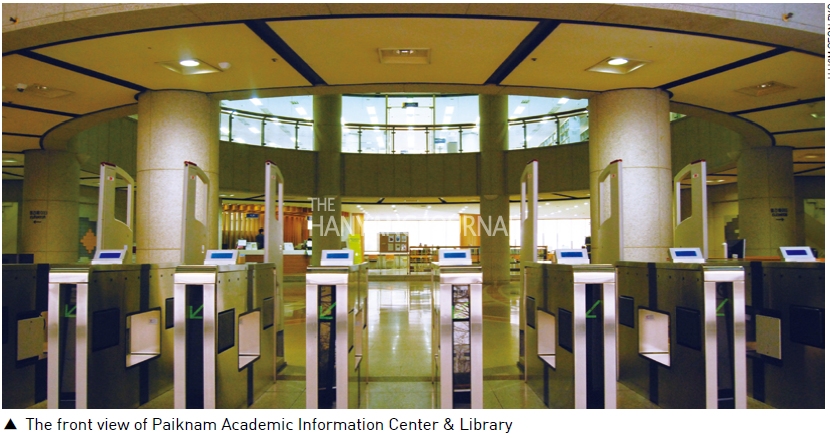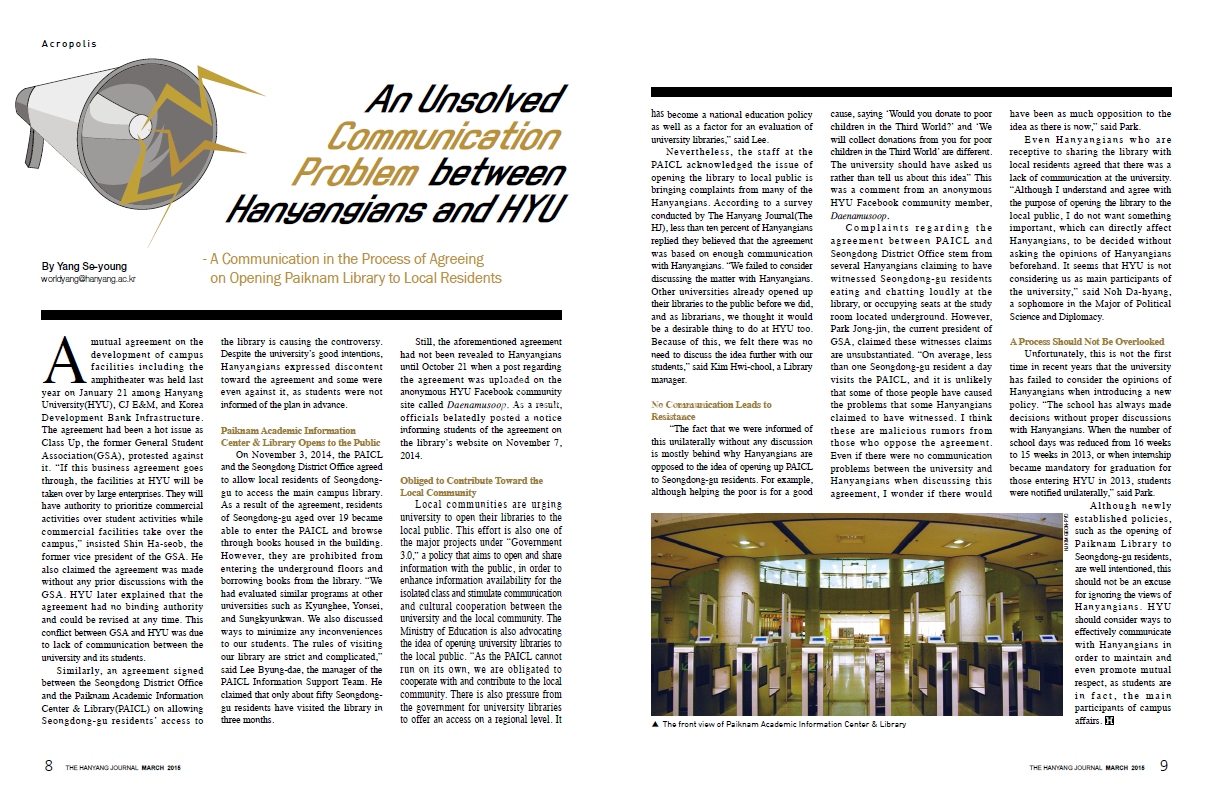A mutual agreement on the development of campus facilities including the amphitheater was held last year on January 21 among Hanyang University(HYU), CJ E&M, and Korea Development Bank Infrastructure. The agreement had been a hot issue as Class Up, the former General Student Association(GSA), protested against it. “If this business agreement goes through, the facilities at HYU will be taken over by large enterprises. They will have authority to prioritize commercial activities over student activities while commercial facilities take over the campus,” insisted Shin Ha-seob, the former vice president of the GSA. He also claimed the agreement was made without any prior discussions with the GSA. HYU later explained that the agreement had no binding authority and could be revised at any time. This conflict between GSA and HYU was due to lack of communication between the university and its students.
Similarly, an agreement signed between the Seongdong District Office and the Paiknam Academic Information Center & Library(PAICL) on allowing Seongdong-gu residents’ access to the library is causing the controversy. Despite the university’s good intentions, Hanyangians expressed discontent toward the agreement and some were even against it, as students were not informed of the plan in advance.
Paiknam Academic Information Center & Library Opens to the Public
On November 3, 2014, the PAICL and the Seongdong District Office agreed to allow local residents of Seongdonggu to access the main campus library. As a result of the agreement, residents of Seongdong-gu aged over 19 became able to enter the PAICL and browse through books housed in the building. However, they are prohibited from entering the underground floors and borrowing books from the library. “We had evaluated similar programs at other universities such as Kyunghee, Yonsei, and Sungkyunkwan. We also discussed ways to minimize any inconveniences to our students. The rules of visiting our library are strict and complicated,” said Lee Byung-dae, the manager of the PAICL Information Support Team. He claimed that only about fifty Seongdonggu residents have visited the library in three months.
Still, the aforementioned agreement had not been revealed to Hanyangians until October 21 when a post regarding the agreement was uploaded on the anonymous HYU Facebook community site called Daenamusoop. As a result, officials belatedly posted a notice informing students of the agreement on the library’s website on November 7, 2014.

Obliged to Contribute Toward the Local Community
Local communities are urging university to open their libraries to the local public. This effort is also one of the major projects under “Government 3.0,” a policy that aims to open and share information with the public, in order to enhance information availability for the isolated class and stimulate communication and cultural cooperation between the university and the local community. The Ministry of Education is also advocating the idea of opening university libraries to the local public. “As the PAICL cannot run on its own, we are obligated to cooperate with and contribute to the local community. There is also pressure from the government for university libraries to offer an access on a regional level. It has become a national education policy as well as a factor for an evaluation of university libraries,” said Lee.
Nevertheless, the staff at the PAICL acknowledged the issue of opening the library to local public is bringing complaints from many of the Hanyangians. According to a survey conducted by The Hanyang Journal(The HJ), less than ten percent of Hanyangians replied they believed that the agreement was based on enough communication with Hanyangians. “We failed to consider discussing the matter with Hanyangians. Other universities already opened up their libraries to the public before we did, and as librarians, we thought it would be a desirable thing to do at HYU too. Because of this, we felt there was no need to discuss the idea further with our students,” said Kim Hwi-chool, a Library manager.
No Communication Leads to Resistance
“The fact that we were informed of this unilaterally without any discussion is mostly behind why Hanyangians are opposed to the idea of opening up PAICL to Seongdong-gu residents. For example, although helping the poor is for a good cause, saying ‘Would you donate to poor children in the Third World?’ and ‘We will collect donations from you for poor children in the Third World’ are different. The university should have asked us rather than tell us about this idea” This was a comment from an anonymous HYU Facebook community member, Daenamusoop.
Complaints regarding the agreement between PAICL and Seongdong District Office stem from several Hanyangians claiming to have witnessed Seongdong-gu residents eating and chatting loudly at the library, or occupying seats at the study room located underground. However, Park Jong-jin, the current president of GSA, claimed these witnesses claims are unsubstantiated. “On average, less than one Seongdong-gu resident a day visits the PAICL, and it is unlikely that some of those people have caused the problems that some Hanyangians claimed to have witnessed. I think these are malicious rumors from those who oppose the agreement. Even if there were no communication problems between the university and Hanyangians when discussing this agreement, I wonder if there would have been as much opposition to the idea as there is now,” said Park.
Even Hanyangians who are receptive to sharing the library with local residents agreed that there was a lack of communication at the university. “Although I understand and agree with the purpose of opening the library to the local public, I do not want something important, which can directly affect Hanyangians, to be decided without asking the opinions of Hanyangians beforehand. It seems that HYU is not considering us as main participants of the university,” said Noh Da-hyang, a sophomore in the Major of Political Science and Diplomacy.
A Process Should Not Be Overlooked
Unfortunately, this is not the first time in recent years that the university has failed to consider the opinions of Hanyangians when introducing a new policy. “The school has always made decisions without proper discussions with Hanyangians. When the number of school days was reduced from 16 weeks to 15 weeks in 2013, or when internship became mandatory for graduation for those entering HYU in 2013, students were notified unilaterally,” said Park. Although newly established policies, such as the opening of Paiknam Library to Seongdong-gu residents, are well intentioned, this should not be an excuse for ignoring the views of Hanyangians. HYU should consider ways to effectively communicate with Hanyangians in order to maintain and even promote mutual respect, as students are in fact, the main participants of campus affairs.


